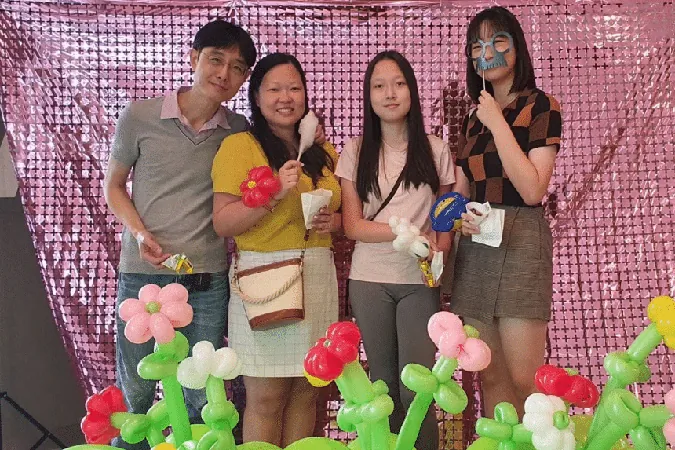
‘It’s Not a Death Sentence’: How One Mother Conquered Stage 4 Lung Cancer and Found Her Purpose in Helping Others
2024-11-26
Author: Arjun
Eight years ago, at the age of 38, Lee Hong Eng endured a relentless cough that persisted for over three months. Alongside this disturbing symptom, she suffered from shortness of breath and mysterious pain in her right shoulder.
Following an X-ray at a local polyclinic, ominous shadows spotted in her lungs prompted immediate hospitalization, where she spent nearly three months under careful medical supervision. Subsequent tests revealed an alarming presence of fluid in her lungs, a reaction to cancer cells that had metastasized from her right lung to her left lung, spine, and lymph nodes.
“I was shocked,” reflects Ms. Lee, now 46. “I couldn’t walk more than 50 meters without feeling breathless. I never expected my persistent symptoms to lead to such a life-altering diagnosis.”
According to the 2022 Singapore Cancer Registry, lung cancer ranks among the diseases with the lowest five-year survival rates—21.9% for men and 37.8% for women—and is frequently diagnosed at advanced stages. Dr. Teh Yi Lin, a consultant with the National Cancer Centre Singapore, highlights the issue: “Lung cancer often develops silently; the early stages do not present overt symptoms. By the time patients feel significant issues, the cancer may have already progressed.”
Facing stage 4 lung cancer—a daunting reality for any patient—Ms. Lee felt an overwhelming sense of responsibility toward her daughters, who were still in primary school at the time. “The initial shock and tears were necessary, but I quickly realized I had to fight,” she shares. “I couldn’t leave my girls.”
Her determination paid off; today, Ms. Lee’s cancer is in remission. Her transformative journey underscores the remarkable advancements in cancer treatment, aiming to provide hope and better outcomes for lung cancer patients.
Navigating the Path of Lung Cancer Treatment
During her treatment in 2016, Ms. Lee underwent a biopsy and subsequent genetic testing on a lymph node affected by cancer. The results showed that she had the ROS-1 mutation, a rare form of non-small cell lung cancer (NSCLC).
Dr. Teh explains, “Gene mutations in NSCLC are more common among younger, non-smoking individuals. ROS-1 rearrangement is less frequent but found in more women and non-smokers, much like the Anaplastic Lymphoma Kinase (ALK) mutation.”
Typically, treatment for advanced lung cancer may include a delicate mix of surgery, chemotherapy, radiotherapy, and targeted therapies. Dr. Teh emphasizes that while advanced-stage lung cancer may be incurable, treatments focus on symptom management and prolonging life.
Ms. Lee started with chemotherapy every three weeks for about 1.5 years, then transitioned to targeted therapy for another 18 months. Despite her optimistic progress, a routine MRI revealed that cancer had spread to her brain, resulting in 11 lesions—an unfortunate but common occurrence among lung cancer patients. She underwent a brief yet intense course of gamma knife radiotherapy, and now relies on targeted medication to keep her cancer controlled.
Throughout her ordeal, Ms. Lee has faced numerous side effects including slurred speech and brain fog, but she manages these challenges through lifestyle adjustments and medication.
Building a Support Network for Lung Cancer Patients
In 2019, Dr. Teh established the Lung Cancer Education and Advocacy for Patients (Leap), which has positively impacted over 600 lung cancer patients through various support services, including medical appointment coordination and financial assistance. “Every patient's journey is unique,” Dr. Teh notes, “and Leap provides a community where patients and families can share experiences and learn about the latest in lung cancer care.”
Ms. Lee, once a beneficiary of this program, has transitioned into a role as a patient advocate within Leap. “I want to share my journey and show others there is hope,” she expresses. “It’s essential for newly diagnosed patients to understand that it’s not a death sentence.”
She actively promotes community connection through monthly events, from educational sessions to wellness activities. Recently, Leap hosted its Resilience in Bloom event, celebrating cancer survivors and facilitating discussions among around 60 participants.
Despite the unpredictability of her health journey, Ms. Lee maintains a positive outlook. Once a homemaker, she has since taken on part-time jobs while advocating for cancer patients. She even completed a data engineering course and now works as an operations manager for a tech startup—proof that resilience can indeed bloom even in adversity.
Above all, Lee treasures her time with family. She delights in watching her daughters, now 16 and 19, grow into remarkable young adults. Her journey stands as a beacon of hope, reminding us all that even in the battle against cancer, life continues—and hope prevails.

 Brasil (PT)
Brasil (PT)
 Canada (EN)
Canada (EN)
 Chile (ES)
Chile (ES)
 España (ES)
España (ES)
 France (FR)
France (FR)
 Hong Kong (EN)
Hong Kong (EN)
 Italia (IT)
Italia (IT)
 日本 (JA)
日本 (JA)
 Magyarország (HU)
Magyarország (HU)
 Norge (NO)
Norge (NO)
 Polska (PL)
Polska (PL)
 Schweiz (DE)
Schweiz (DE)
 Singapore (EN)
Singapore (EN)
 Sverige (SV)
Sverige (SV)
 Suomi (FI)
Suomi (FI)
 Türkiye (TR)
Türkiye (TR)